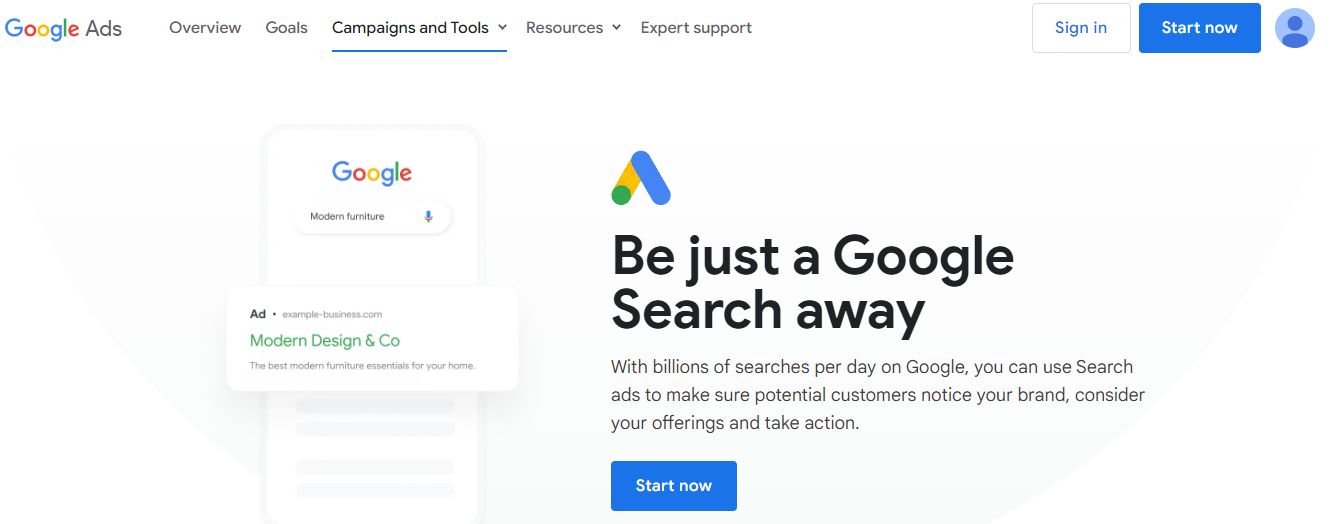Longtail keywords are more effective than their head or short-tail keywords counterparts. These are specific and bring higher conversions. These are less searched and have limitless versions. The following article will describe everything about these longtail keywords and give an idea of how to use them for SEO.

Page Contents:
What Are Longtail Keywords?
The keywords having a low search volume and a high conversion rate are longtail keywords. These keywords are more specific than the head keywords and have less competition. These keywords are used when the visitors are near the purchasing or conversion point.
For example, “chocolate” is a head keyword but “Is chocolate a stress buster” is a long tail keyword as it clearly describes the query of the visitors.
Why Are Longtail Keywords Important For SEO?
Long tail keywords can be ranked easily as compared to the short ones because of the less competition. If you want more conversions and sales then longtail keywords are the most effective SEO tactic for you. The longer the search term the more easily it finds the audience for that particular niche.
Since longtail keywords are more specific they help in increasing the visibility of your website. They help to optimize the website for different categories of searches. Using longtail keywords you can also rank for short tail once and cope with the upcoming future trends.
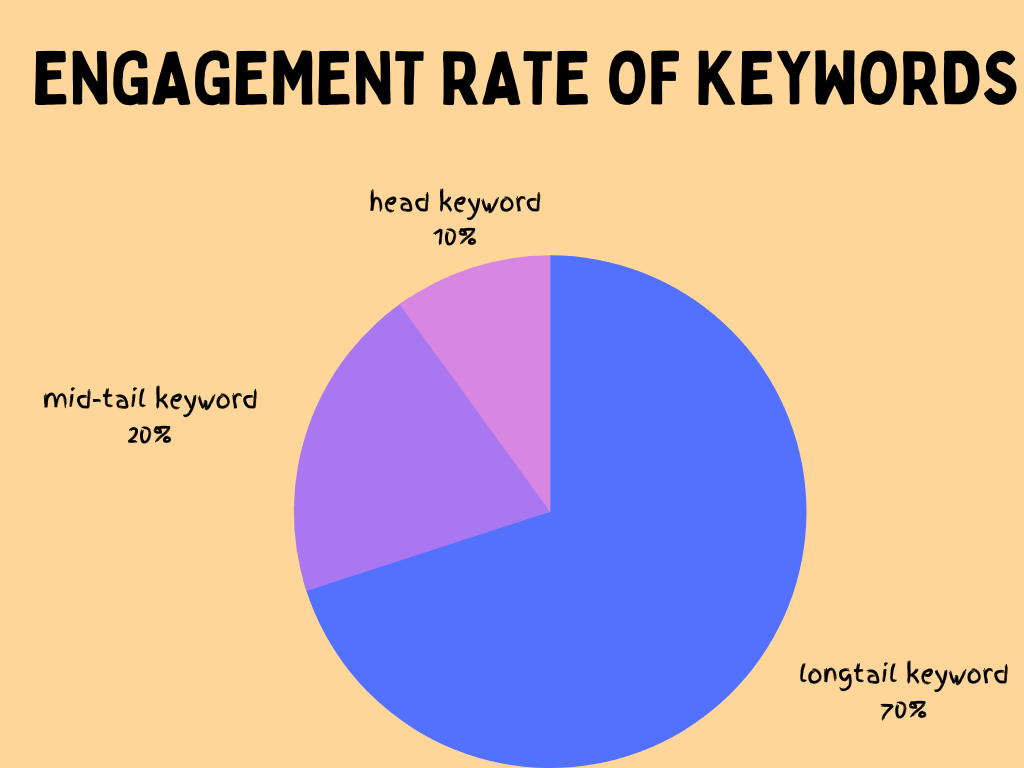
These long phrase helps you to optimize the blog strategy and create personalized content. According to MOZ, 70% of online searches are longtail keywords. They work better for voice searches. People now prefer to talk with search engines as humans and generate long tail keywords.
How To Use Long Tail Keywords?
Before using longtail keywords for your content you need to find the relevant long key phrases. Finding key phrases and analyzing the search intent for the targeted key phrase helps to gain more profit from your website. Here are some ways to find the perfect keyword matches for your niche.
1. Use Google
The “searches related to” and “people also ask” sections of Google SERP can help you find the primary keywords related to your niche.
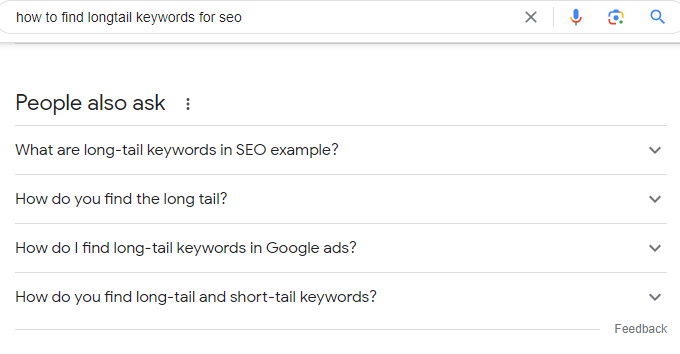
These sections help you to figure out what people are searching for and what are the search intent behind the keywords. You can get content-framing ideas from them.
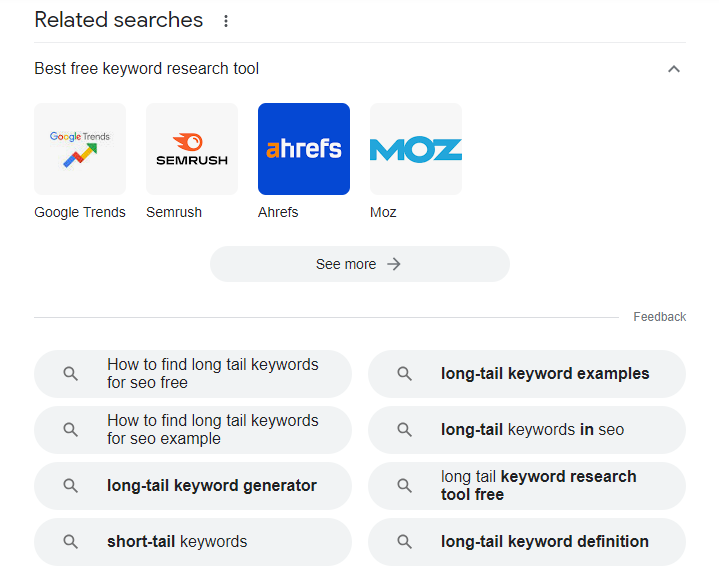
2. Perform keyword analyses :
Perform keyword analysis using different tools such as Google Trends and check the keyword performance. Use these analytics to make a list of the relevant keywords.
You can also use Google Suggest to find keywords. Other than this there are a lot of tools that can help you find more keywords like SEMrush’s keyword magic tool, HubSpot’s keyword tool, etc.

If used correctly longtail keywords can increase traffic on your site. Adding your keywords smartly is very important. The following are some tips for how to use long-tail keywords in your content.
3. Use relevant long tail keywords:
The first thing while using a long tail keyword is to check that they are relevant to your niche. They should match the main idea of your content and may fulfill the search intent of the users.
4. Place longtail keywords strategically:
Place longtail keywords smartly. they should naturally fit into the content. Add them to the page titles header tags. use them in the introduction of your content. Use long tail keywords in your meta titles, URLs, image descriptions, etc.
5. Do not focus on search volume:
The search volumes of long-tail keywords are low. You should not consider the search volume while choosing a longtail keyword rather choose the most relevant one. Long tail keywords are the best example of quality keywords. They have high conversion rates.
6. Cluster of articles:
Combine closely related articles using longtail keywords. This will benefit in two ways. the longtail keywords are in your content naturally and some other articles are also promoted here.
7. Amplify longtail keywords:
Using only one longtail keyword is not enough. Longtail keywords have 4 or more words that can be rephrased or may get replaced by synonyms. In such a case use should target multiple keywords. Spend enough time upgrading your longtail keyword strategy.
8. Optimize:
Use Google search console data to find the rakings of longtail keywords. You may also discover new keywords that you have not thought of. Then reoptimize your content according to the analysis results.
Cons For Using Longtail Keywords
With so many benefits of using longtail keywords, there are also some challenges for using longtail keywords. The main cons of using longtail keywords are;
1. Limited relevance:
Since every variation in the longtail keyword may not be relevant to the content. Some of them may not match the search intent of the user. Hence, longtail keywords have limited relevance and should be updated frequently.
2. Limited targeting:
These keywords cannot be used as an advertising element as they are very specific and target a limited type of audience only.
3. Hard to identify:
It is not always easy to choose a longtail keyword for your content. Even with tools finding relevant keywords is hard always
4. Low search volume:
Longtail keywords are used very little but only when the customers are ready. Hence they have a low search volume.
5. Limited scalability:
Targeting and using many longtail keywords requires a lot of time and effort. this can create problems in scaling your content with these keywords.
5 Best Tools For Long Tail Keywords
There are so many tools that can help you with all the problems faced by longtail keywords. we have listed 7 best tools for longtail keywords:
1. Answer The Public:

Answer the public is one of the best tools for keyword suggestions. It provides questions related to your seed keyword and suggests more like them. It provides comparison keywords that can enhance your ranking. The tool doesn’t provide any statics on search volume.
2. Ubersuggest:
Ubersuggest is the dedicated tool for keyword suggestions. the keywords suggested are based on the Google SERP and Google ads data. The suggestions are based on the analysis of over 100+ sites. The keyword overview option shows the search volume of the keywords for the last 12 months.

3. LongTailPro:
Long Tail Pro is an all-in-one SEO tool a former desktop keyword research tool. It is a specialized tool that helps to get longtail keywords with high cost-per-click. It only requires one seed keyword and will be able to find every longtail keyword possible.
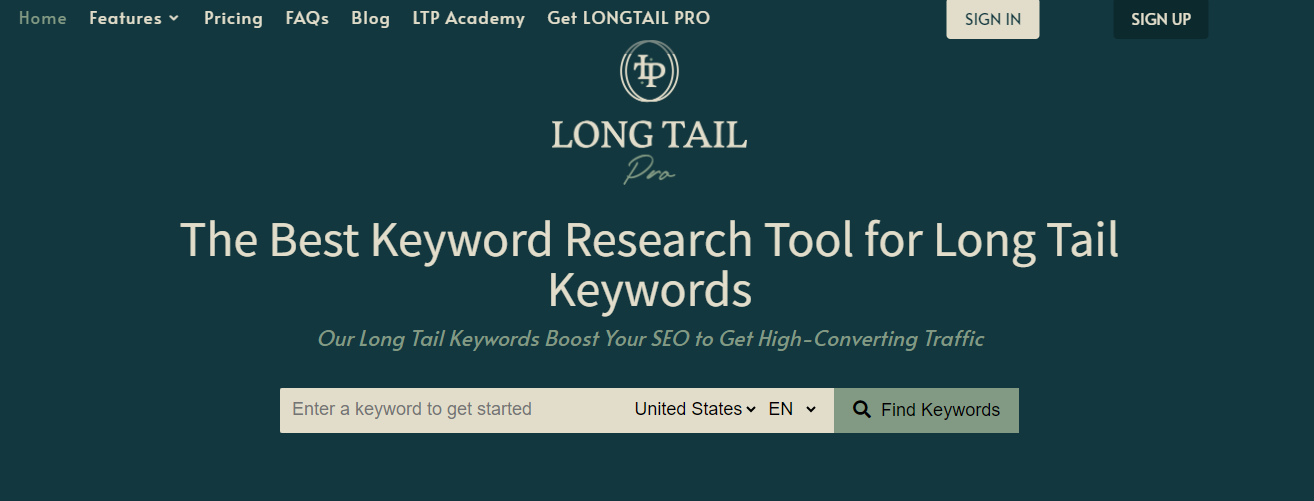
4. Keyword everywhere:
Keyword Everywhere is a browser extension for keyword research. It shows the monthly search volume, cost-per-click, and competition data. It uses Google search trends to find the historic monthly search volumes. It fetches keywords after analyzing Google’s “related search” and “people also ask sections”.

5. Google Keyword Planner:
Google Keyword Planner is a free keyword research tool. The keyword planner suggests both long and short keywords. Google has massive raw data and certainly the best-fit keywords. You don’t need to have a Google account to carry out the keyword research.
